I’ve discovered another mysterious disappearance tied to the Cecil Hotel. This one somehow eluded all previous archival searches, and it’s quite an odd and interesting case. I call it The Case of the Missing Consul.
Around noon on December 31, 1947, Alexander M. Galbraith, 50, stepped out of the office where he had served for the past four years as the British Consul for Pittsburgh, Pennsylvania, and vanished. His daughter Jean, who was his secretary, said he’d been brooding about the possibility of losing his position to one of the career diplomats who’d been freed up by the end of the war. He was right to worry. That very morning, he’d been informed that his services were no longer needed. The reason given was that, though Scottish-born, he was a naturalized American.
Galbraith, who’d been a WW1 flying ace and had a fiery reputation, was incensed. He was passionate about his position, giving pro-British speeches to local men’s clubs, dedicating long hours to aiding war brides whose American grooms had abandoned them. And now some bureaucrat was going to take his place? It was too much for him to stand.
On New Years Day, Deputy Coroner Ken O’Toole said Galbraith had come in, asking about a pair of missing spectacles. But a search of the neighborhood came up empty. A Pullman porter saw a photograph of the missing man, and told police he was certain he’d served him on a train bound for Chicago. Chicago authorities were alerted, but Galbraith was nowhere to be found. Searches in Washington and Cleveland also turned up nothing.
His wife and daughters were frantic. Weeks passed with no word. The shame of losing his job must have been too much. Had Galbraith killed himself?
He had not.
On January 27, 1948, Galbraith sent a telegram to George B. Stelluto, proprietor of The Green Grill near the Pittsburgh morgue, asking for a loan of $50. Stelluto, a friend, went to the police.
Later, Galbraith told reporters in Los Angeles that he’d only wired Stelluto because he didn’t have any money for food. He needed a stake to get back on his feet.
So what had happened to him?
“I blew my top when I was informed I had been relieved. I packed my bag with several suits and came by train, although I have very little recollection of my departure or arrival. I don’t remember much until I came to here in this hotel. I vaguely recall being in Canton, Ohio and Chicago, but I’m not sure how I got here or what I did during that week.” He said he hadn’t wanted “to be a burden” to his wife of daughters. As for the telegram, he supposed that Stelluto, thinking “he was serving my interests best” had gone to the Chief of Police. “Maybe he was serving my best interests. I hope so.”
Reached at home, his daughter Jean said “We’re all very much relieved that Daddy’s been located. We certainly don’t feel that he’ll be a burden on us and we’re going to send him the money to fly home. I’m sure he won’t have trouble finding another job.”
Galbraith was one of the lucky ones. Many other troubled souls had found a bed at the Cecil and lacked the courage to ask for help. He went home. Reporters, who always want more, asked after him. Jean said that he was somewhat unwell from his travels, and was resting. Jean protected her father well. We hear nothing more about him, and sometimes hearing nothing is the happiest ending of all.




























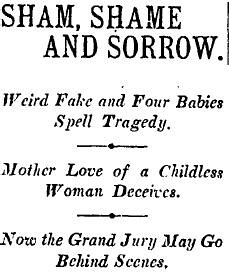

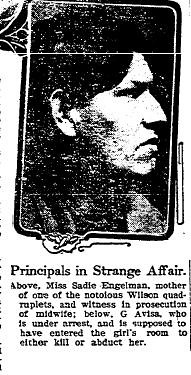


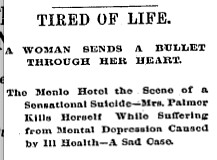
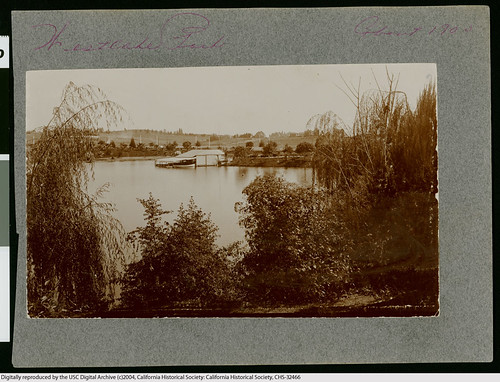
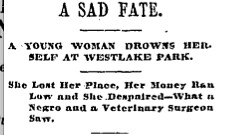

 “
“



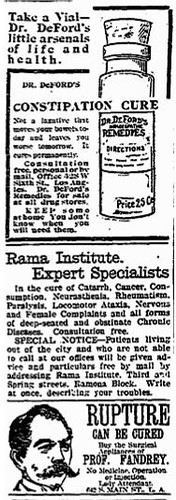


 This battle of titans began in the fall of 1894, when the miraculous magnetic healer known as the Boy Phenomenon (aka Dr. Stuart Franklin Temple) came to the city “with Healing in his Hands,” offering his free curative powers to the deaf, blind, sick lame, paralytic and whomever else who managed to drag themselves to the Los Angeles Theater. Before the healing commenced, Temple’s manager, the Great Diagnostician Professor W. Fletcher Hall, lectured on the medical research supporting the application of Vital Force and Animal Magnetism. The duo took the show on the road to Pasadena, San Bernardino and San Diego, but then parted ways in 1895. The following year, Professor Hall reappeared in Los Angeles with a new protégé, a young German boy he discovered among the “rubbers” in the Turkish baths at St. Louis, who must have impressed Hall with his restorative manual dexterity. His given name was Carl Herrmann, but Hall dubbed him The Boy Wizard, and distinguished him in advertisements from Dr. Temple by claiming he “daily generates ten times more magnetism that the former Phenomenon.”
This battle of titans began in the fall of 1894, when the miraculous magnetic healer known as the Boy Phenomenon (aka Dr. Stuart Franklin Temple) came to the city “with Healing in his Hands,” offering his free curative powers to the deaf, blind, sick lame, paralytic and whomever else who managed to drag themselves to the Los Angeles Theater. Before the healing commenced, Temple’s manager, the Great Diagnostician Professor W. Fletcher Hall, lectured on the medical research supporting the application of Vital Force and Animal Magnetism. The duo took the show on the road to Pasadena, San Bernardino and San Diego, but then parted ways in 1895. The following year, Professor Hall reappeared in Los Angeles with a new protégé, a young German boy he discovered among the “rubbers” in the Turkish baths at St. Louis, who must have impressed Hall with his restorative manual dexterity. His given name was Carl Herrmann, but Hall dubbed him The Boy Wizard, and distinguished him in advertisements from Dr. Temple by claiming he “daily generates ten times more magnetism that the former Phenomenon.” 
